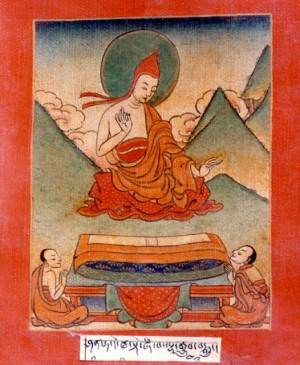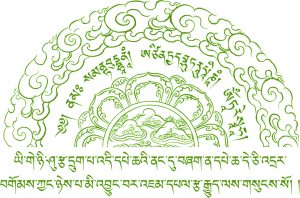The younger son of a royal family came to the monastery Sri Nalanda to be ordained in the mahasanghika order. But as a pampered child, he was difficult and unreasonable, he never studied or meditated. His laziness was so much that he annoyed most of his peers and was branded Bhusuku, “The shiftless one.” Finally, Bhusuku’s behavior earned him a severe warning from the abbot that unless he mended his ways and took his turn to sit upon the temple throne to recite his memorized portion of the sutras like all the other monks; he would be expelled from the monastery. His turn was the following morning, and having not memorized anything, many of his peers imagined the event of the following day would be amusing. However, the abbot was a very kind man, and at night fall, he visited Bhusuku to give advice. Being desperate, Bhusuku said he’d do anything so that he will not fail the next morning. So the abbot told him to spend the whole night reciting the mantra of Manjusri and gave Bhusuku the secret precepts of Manjusri’s sadhanas, and the blessing of the mantra, then he left.
Knowing his own weakness well, Bhusuku tied the collar of his robe to the ceiling in case he nod off during the night, and all night long he recited the mantra over and over again. At dawn, Bhusuku jerked awake and here he was, not wiser than he’d been the night before. Just then, a great voice boomed from the ceiling: “What do you think you’re doing!”
Bhusuku looked up and saw an enormous figure floating in the air above his head, he said he have been invoking the aid of Lord Manjusri to help him recite a sutra on that very morning and proceeded to ask who the floating person was. In reply, the unusual guest said “That’s a foolish question. You’ve been invoking me half the night.” Startled, Bhusuku finally realized he was talking to Manjusri himself! And immediately pressed his palms together in the gesture of supplication and begged for the power and realization of every quality of perfect insight.
Bhusuku then went to the great hall and mounted the temple throne before his audience, then he levitated into the air above the throne and his body blazed with great radiance. He then began to compose and recite the sublime and profound discourse that came to be called the Bodhicaryavatara, “The Pathway to Enlightenment.” After he completed the 10th and last chapter he rose into the sky to the height of 7 palm trees. Here he was renamed the monk Santideva. People began placing flowers where his feet touched and the pundits humbly requested a commentary of his discourse of which Shantideva obliged. But he refused to be the abbot when asked.
That night, after leaving his robes, begging bowl and all his sacred artifacts on the altar as offering, he left secretly. He travelled and came to the town Dhokiri where he made a wooden sword painted in gold, and requested a position as swordsman with the palace guard. He served the King for 12 years until on day when one of the guards saw Shantideva’s sword was actually made of wood. The guard reported to the King and so he was summoned to the throne room. The king demanded to see Shantideva’s sword, although was warned of the harm it will bring, the king insisted. So, after convincing everyone in the room to close one eye, he took out his sword and a light as intense as 10 suns filled the room, blinding each unprotected eye. Everyone fell to their knees, entreating the yogin’s forgiveness and mercy. Santideva then began to rub his healing saliva onto each injured eye, magically restoring the lost sight.
Shantideva left Dhokiri that very day and took up residence in a cave and practiced his sadhanas for some time. One day, a royal huntsman came to court with rare game for the king’s table and told the king he saw Shantideva. Immediately, the king set for the mountains with a large entourage, there they saw Shantideva sitting on a deerskin meditating in front of what appeared to be a blank rock wall. The king told the yogin all that he had heard and asked why does he harm living beings. In reply, Shantideva said he do not kill, but heal. “Understanding that all things are but insubstantial figments of the imagination, projections of the mind. Enter the path of liberation.” Shantideva then converted the king of Dhokiri, and set all his people upon the path of truth. He served them faithfully for 100 years before ascending to the Paradise of the Dakinis.
em
Busque no site
Busca por Assunto
Artigos Recentes

The Smile of Sun and Moon – A Commentary on The Praise to the Twenty-One Taras
The Smile of Sun and Moon A Commentary on The …Leia Mais »
Jamgon Kongtrul Lodroe Thaye – CA
Volume 5 05_pdf_rgya chen bka’ mdzod_ca 639KB 198KB 280KB 1.47MB ‘jam …Leia Mais »
Yamantaka
Yamantaka é expressão irada do Buda da Sabedoria Manjushri, também …Leia Mais »
Jamgon Kongtrul Lodroe Thaye
‘jam mgon kong sprul rgya chen bka’ mdzod Dear …Leia Mais »
Tsa Lung
A saúde do nosso corpo subtil é de extrema importância …Leia Mais »



 Cintamani - Meditação e Arte - Copyright 2020 - Todos os direitos reservados.
Cintamani - Meditação e Arte - Copyright 2020 - Todos os direitos reservados.